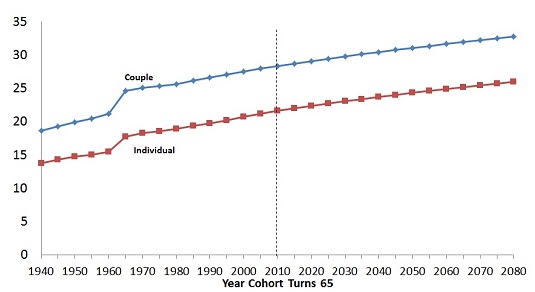Retired Couples Receiving More Years of Support under Social Security
Posted: January 18, 2013 Filed under: Aging, Income and Wealth, Shorts, Taxes and Budget 3 Comments »Increased time spent in retirement is a driving factor behind rising Social Security and Medicare costs. A couple that stopped working at the earliest Social Security retirement age in 1940 would expect to receive 19 years of retirement benefits; a similar couple in 2010 would expect 28 years of benefits. By 2080, couples could be receiving retirement support for 33 years.
This calculation assumes both partners are the same age and will have average life spans. Partners of different ages and those (often higher-income) couples who expect to live longer, such as nonsmokers, receive even more years of support.
As it turns out, these many years in retirement affect more than Social Security balances. Retiring longer also reduces the share of Social Security benefits spent on recipients in their last (e.g., ten) years of life and the income tax revenues to support other government functions.
Expected Years of Retirement Benefits, Earliest Year of Retirement
C. E. Steuerle and S. Rennane, Urban Institute 2010. Calculations based on mortality data from the 2010 OASDI Trustees’ Report.
Assumption: in a couple, at least one partner is still living. ERA was set at 62 for women in 1956 and men in 1961.
For more on this topic, see Correcting Labor Supply Projections for Older Workers Could Help Social Security and Economic Reform.



What percentage comes from richer people being able to live longer and pay the 22% tax on benefits received because they have it – and what percentage goes to nursing homes as the less well off become wards of the state as their ability to take care of themselves declines?
[…] Posted at The Government We Deserve on […]
[…] today retire for about a decade longer than they did when Social Security first started paying benefits. The biggest winners of this […]